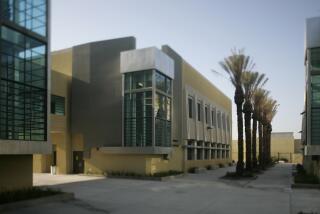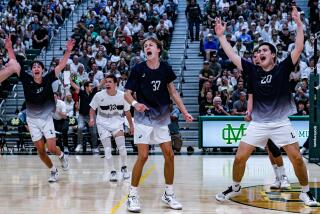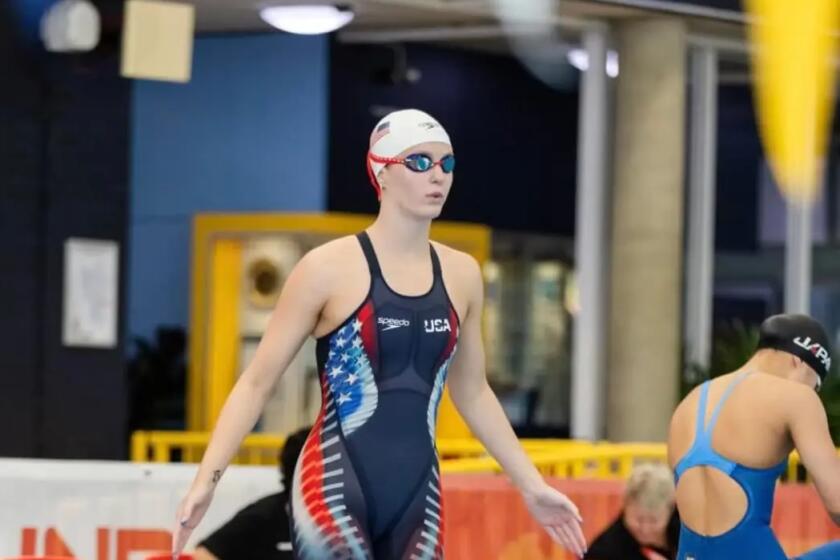HIGH SCHOOL FOOTBALL / SEASON PREVIEW : Lucky to Be Alive : All-American Phil Fonua of Mira Costa High Suffered Brain Aneurysm, but Is on the Mend
- Share via
As he has so often this summer, Phil Fonua walked into the weight room at Mira Costa High in Manhattan Beach on Aug. 10 to work out in preparation for the football season.
With college coaches from such schools as Notre Dame, USC and Arizona inquiring about his talents, the 17-year-old defensive lineman eagerly anticipated his senior season.
That particular Wednesday afternoon is one his family will not soon forget, however. While hoisting dumbbells for a set of curls, Fonua collapsed to the floor and fell unconscious before a crowd of teammates.
Paramedics were quickly on the scene, and Fonua was rushed to Torrance Memorial Medical Center, where it was determined he had suffered a life-threatening brain aneurysm. The prep All-American underwent a successful four-hour operation the next day and is recuperating at home after three weeks of therapy.
David Alexander, a neurosurgeon who is monitoring Fonua’s progress, said his patient is lucky to be alive.
“A third of the people who have a brain aneurysm do not survive the first 24 hours,” Alexander said. “That is a very significant statistic. Phil has been helped by the fact that he is young and physically strong. He’s made tremendous progress.”
While the prognosis for full recovery is good, it remains to be seen whether Fonua will ever be able to return to competitive athletics. Alexander and other doctors agree that sports is definitely out for the next year.
Fonua, 6-feet-2, 275 pounds, has never had any significant medical problems. His aneurysm was caused by a congenital condition--a weakening in the wall of the blood vessel that caused it to bulge, leak and eventually rupture.
Experts say the condition would have been nearly impossible to detect, and a weakened blood vessel is more likely to rupture in older people.
Dr. Melvin Snyder, who performed the surgery, said athletics did not play a part in the aneurysm but that Fonua’s “very active physical activities,” including weightlifting, could have contributed to the blood vessel rupturing at an early age.
Fonua spent last week at Daniel Freeman Memorial Hospital in Inglewood with a team of eight doctors and therapists aiding his rehabilitation. He was released on Friday but will return to the hospital five days a week for the next month or so as part of his continuing therapy.
His physical and mental skills have been slowed a bit by the aneurysm, but Fonua is improving and expects to return to school in a few weeks. Joanne Levy, his case worker at Daniel Freeman, said he will have to start slowly and build back to his old schedule.
“A full day at school is likely to tire him out quickly,” she said. “These things take time, and it’s different when you’re at home and not in the hospital with everyone taking care of you.”
Mira Costa Coach Don Morrow, who guided the team to a Southern Section championship last season, said the loss of the school’s star player has been emotional for coaches and teammates.
Morrow was getting helmets ready for preseason drills when Fonua collapsed. When he got there, the player who is often referred to as the “Terminator,” was on the ground and appeared to be having a seizure.
“I don’t think I’ll ever forget that day,” he said. “The irony is that Phil is such a big and strong guy that you never expect him to be down in a helpless condition. Our thoughts have been with him.”
The team split duties visiting Fonua in the hospital, where nurses said he had more well-wishers than any other guest.
Fonua does not remember anything about Aug. 10, which doctors say is normal. His speech is a little slow and groggy, but he dreams of returning to the weight room and the football field sometime this fall.
“I’d like to be back by the fifth game,” he said. “I’m really starting to feel better. I’m a little weak but getting stronger. I wouldn’t be scared to take a hit. I wouldn’t be scared at all.”
James Joachim, Fonua’s family physician, is optimistic about his patient’s recovery but is cautiously approaching the case.
This year “is completely out of the question,” Joachim said. “I don’t think any physician would clear Phil for any contact or non-contact sport. He and his family realize life is more important than the risk of the recurrence of a serious head injury.
“But I know there is a very courageous spiritual side to this young man that may change what happens in the future. (But) at this moment, I would not ever allow him to participate in any contact or non-contact sport, for at least a year. His family knows this is well-advised medical advice.”
Fonua’s yearning to don pads and a helmet was revived last Wednesday when he attended a Mira Costa practice with his therapist, the first reunion with all of his teammates since the aneurysm. It was an emotional meeting, one Morrow decided to keep within the team by banning reporters.
Family members are grateful Fonua is improving but understand his desire to return to sports. The middle of five children, Fonua is the first to excel in athletics. He emerged in football last season as a starting fullback and defensive tackle, rushing for 403 yards and 15 touchdowns, catching 16 passes for 258 yards and four touchdowns and finishing with 41 tackles, 16 sacks and two caused fumbles.
Mira Costa defeated Garden Grove Rancho Alamitos, 29-17, in the Division VII title game, the first championship for the school.
Fonua is a rare three-sport standout. He was the starting center on the basketball team that won the Ocean League championship, and he placed fourth in the shotput at the state track and field championships in June. He is powerful, quick and can dunk a basketball.
Football is the sport Fonua most wants to continue in college, and he has been mentioned on several preseason high school All-American teams. Recruiters have sent him letters since last year, with many of the major colleges promising a scholarship.
When and if Fonua resumes his athletic career remains to be seen.
Alexander said his patient has not had complications and could resume a fairly normal schedule within a few months if things progress as they have.
“I wouldn’t rush him into anything, however,” Alexander said. “He won’t be playing football by the fifth game.”
Fonua sees things differently.
“I’m just thinking about getting stronger,” he said. “And I’m glad I’m alive.”
*
Times staff writer Rob Fernas contributed to this report.
More to Read
Get our high school sports newsletter
Prep Rally is devoted to the SoCal high school sports experience, bringing you scores, stories and a behind-the-scenes look at what makes prep sports so popular.
You may occasionally receive promotional content from the Los Angeles Times.






